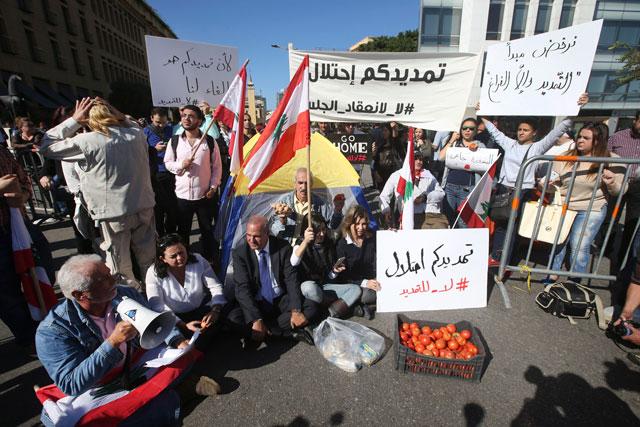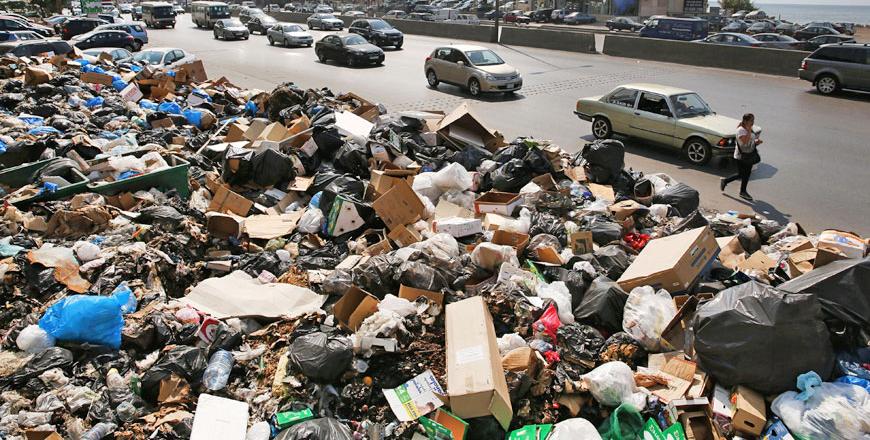You are here
Lebanese parliament extends own term till 2017 amid protests
By Reuters - Nov 05,2014 - Last updated at Nov 05,2014

BEIRUT — Lebanon's parliament voted on Wednesday to extend its own mandate until 2017 citing security concerns linked to the civil war in neighbouring Syria, but critics including the European Union condemned the move as unconstitutional.
Lebanese politics, long dogged by sectarian divisions, has become deeply deadlocked as the Syrian war exacerbates party rivalries. Lebanon has been without a president since May because feuding lawmakers cannot agree on a candidate.
Ninety-five out of 97 parliamentarians present voted for the extension bill, Lebanon's National News Agency said. It is the second postponement of parliamentary elections, which should originally have taken place in June 2013.
An umbrella group of Lebanese non-governmental groups had urged lawmakers not to extend their mandate, which had been due to expire this month.
Downtown Beirut, where the parliament is located, was locked down by security forces for the vote and protesters hurled tomatoes and eggs at police.
"It is another blow to democracy in Lebanon. Lebanon has a long history of democracy and we are seeing, unfortunately, a political class that is going against the tide of history," said Makram Ouaiss, one of the protest organisers.
The head of Lebanon's Maronite Christian community, Patriarch Beshara Al Rai, called the extension "illegitimate and unconstitutional", according to the National News Agency.
Angelina Eichhorst, head of the EU delegation in Lebanon, said on Twitter that Wednesday was "a sad day in Lebanon's constitutional history".
Political analysts said Lebanese politicians were using the regional uncertainty as an excuse to dodge elections.
"It's very symptomatic of the Lebanese political class. It's a political class that is pretending that it wants to save the country but at the same time violating the constitution," said
Sahar Atrache, a Lebanon analyst for International Crisis Group.
‘Irresponsible’
"Politicians are all in a wait-and-see mode. People are waiting to see how things evolve on the regional level. They are very interesting in protecting their own gain," Atrache told Reuters, branding the extension as "irresponsible".
The fighting in Syria has deepened the sectarian rifts in its much smaller neighbour, with Lebanese Shiite Muslims backing the forces of Syrian President Bashar Assad while Sunnis supporting his opponents.
Hardline Islamists have also won a degree of support among Lebanese Sunnis, though the community's leaders say such radical groups have no major backing in Lebanon.
The decision to extend parliament's mandate drew support from lawmakers from all the main groupings.
Lebanon's sectarian divisions have been complicated by the regional rivalry between Shiite Iran and Sunni Muslim Saudi Arabia. Without a rapprochement between the two, politicians say decision-making in Lebanon is likely to remain stalled.
A government formed in February with Saudi-Iranian blessing has spared Lebanon a complete political vacuum at the top. But that government has struggled to take even basic decisions. The parliament is barely functioning.
The Syrian conflict has also triggered some of Lebanon's worst violence since its own 1975-90 civil war. There has been several bouts of fighting in the coastal city of Tripoli since the Syria war erupted in 2011 and Sunni Muslim gunmen briefly took over the north eastern town of Arsal this summer.
New York-based Human Rights Watch said on Tuesday ahead of the vote that it would tarnish Lebanon's image as a relatively open and democratic country in an authoritarian region.
"It would be a shame for Lebanon to go down the route of other Arab states where elections are held at the whim of their rulers or not at all," said Nadim Houry, deputy director of Human Rights Watch in the Middle East and North Africa.
"Lebanon should instead play a leading role in political rights and civil liberties for other states in the region."
Related Articles
BEIRUT — To the casual visitor, Lebanon may seem like a tiny slice of Mediterranean modernity and coexistence in a turbulent region plagued
With Lebanon's most powerful political parties funded and often directed by regional powers, the country has for decades been affected by events in the Middle East.
BEIRUT — Lebanon's government announced a new election law after a Cabinet session on Wednesday, ending months of tense discussions and pavi


















